Sep 3, 2025 12:02 PM
Keeping the Flame at Van Gelder Studio
On the last Sunday of 2024, in the control room of Van Gelder Studio, Don and Maureen Sickler, co-owners since Rudy Van…
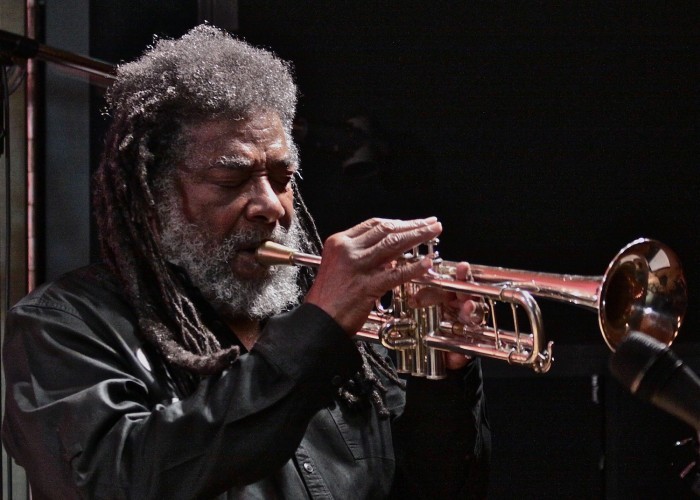
Trumpeter and composer Wadada Leo Smith hosted his third CREATE Festival April 6 and 7 at Firehouse 12 in New Haven, Connecticut.
(Photo: Maurice Robertson)The sheer force of Wadada Leo Smith’s shaman-like charisma filled the room before he even took the stage at Firehouse 12, the New Haven, Connecticut, venue that hosted the trumpeter’s third CREATE Festival on April 6 and 7.
As Smith milled about the intimate performance space before the first show, smiling and embracing his daughters and granddaughters seated in the front row, it was clear that this was a family affair. A few of the composer’s grandchildren even performed at this year’s festival—guitar-playing grandson Lamar Smith opened day one with his own Hendrix-meets-Miles improvising ensemble, and 8-year-old granddaughter Jaya Smith-Tavaris opened day two with solo blues piano pieces as her 5-year-old sister, Belle Smith-Tavaris, danced.
Though he’s been actively creating since the early ’70s, it’s only been within the past 10 years or so—in the wake of being a 2013 finalist for the Pulitzer Prize in Music for his monumental Ten Freedom Summers—that Smith has garnered widespread praise. In his fifth decade as a performer, the 77-year-old composer now has earned the kind of reverence reserved for icons like Ornette Coleman, Cecil Taylor and Albert Ayler.
Day one of the CREATE Festival opened with a thunderous set from the Lamar Smith Ensemble. Sparked by Melvin Gibbs’ ferocious fuzz-bass, drummer Pheeroan akLaff’s whirlwind free playing and provocative sonic chatter from experimental sound designer Velibor Pedevski (aka Hardedge), guitarist Smith wailed on his wah-inflected guitar in unabashed fashion. Together, this edgy ensemble performed bombastic versions of the elder Smith’s “Blue Meditations” and the younger Smith’s adventurous no-time piece, “No. 2.”
Violinist Mona Tian next performed striking solo versions of Smith’s “The First Light Gold” and “The Second Light Blue,” two segments from his Rosa Parks: Pure Love. An Oratorio Of Seven Songs, a meditation on the civil rights movement that will see its premiere in fully realized 15-piece form at New York venue The Kitchen from April 26-28.
Smith’s NDA ensemble—minus bass clarinetist-flutist Dwight Andrews, who had an emergency preventing him from attending the gig—delivered the through-composed “Spirituals: The Language Of Love” from the bandleader’s 1979 ECM album Divine Love, perfectly balancing exactitude and openness. Vibraphonist Bobby Naughton, who participated in the original recording, brought richly dissonant four-mallet voicings to the table, setting up Smith’s probing trumpet, Eunhye Jeong’s sparsely-appointed piano work, and John Lindberg’s humungous bass tones and virtuosic arco work.
In a dramatic change of pace, Smith shifted to solo trumpet, playing along with a pre-recorded soundtrack of himself and colleagues Lester Bowie and Kenny Wheeler on “Tastalun” from Divine Love. The trumpeter exerted marvelous control in the high register along with segments of circular breathing and bursts of multiphonics on this tightly woven showcase.
The evening closed with an explosive merging of Smith’s electric Najwa trio (featuring bassist Bill Laswell and guitarist Smith) and the improvising power trio Harriett Tubman (guitarist Brandon Ross, bassist Gibbs and drummer JT Lewis). Their crunching set resonated with the kind of dense, throbbing intensity that recalled Miles Davis’ most raucous and subversive electric bands of the mid-’70s. Gibbs navigated the bubbling, grooving undercurrent with Laswell’s singing fretless electric bass on premieres of “Spiritual Horizons” and “Lake Tanganyika,” two imposing pieces from a new suite exploring the concepts of quantum physics, parallel universes and shifting between dimensions. Smith urged on Gibbs and Laswell in a kind of “bass-off” during “Horizons,” and on the latter piece, Ross, a wildly inventive guitarist, unleashed some ferocious distortion-laced licks. The bandleader exercised zen-like restraint in the face of this dense barrage, putting a premium on space as he floated plaintive, muted trumpet melodies atop the sonic maelstrom anchored by Lewis’ muscular, polyrhythmic attack.
Sunday opened with a series of intimate encounters: cellist Ashley Walters improvising freely in a duet with Japanese Butoh dancer Oguri, and Smith engaging with Chinese pipa player Min Xiao-Fen and dancer Oguri in a highly interactive trio for the composer’s “Lake Biwa; A Full Moon Pure Water Gold.”
The festival concluded in turbulent, probing fashion with Smith’s Golden Quintet, featuring pianist Erika Dohi, cellist Walters, bassist Lindberg and drummer akLaff, performing two compositions, “JFK In Dallas: Parkland: 11.22.1963,” which reflects on the assassination of President John F. Kennedy, and “Miriam Makeba: A Magnificent Voice: The Empress Of Peace: 1932-2008,” celebrating the life of the South African singer and activist.
Throughout the two-day event at Firehouse 12, the Mississippi-born trumpeter soloed with rare authority while conducting the freewheeling proceedings with the deft hand of a true maestro. DB
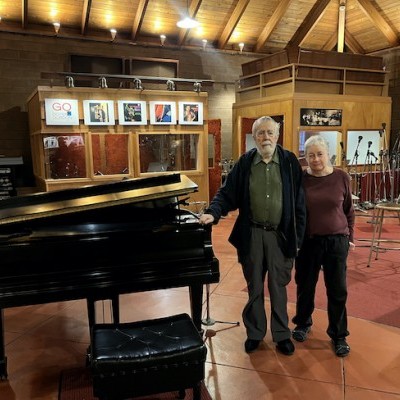
Don and Maureen Sickler serve as the keepers of engineer Rudy Van Gelder’s flame at Van Gelder Studio, perhaps the most famous recording studio in jazz history.
Sep 3, 2025 12:02 PM
On the last Sunday of 2024, in the control room of Van Gelder Studio, Don and Maureen Sickler, co-owners since Rudy Van…
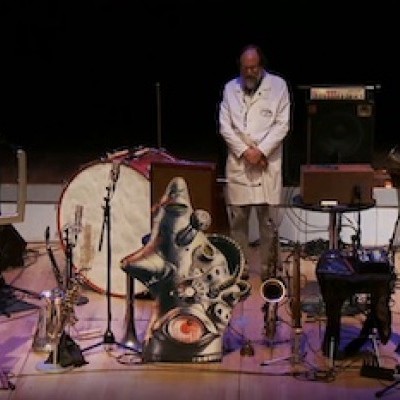
Trio aRT with its avalanche of instrumentation: from left, Pheeroan akLaff, Scott Robinson and Julian Thayer.
Sep 3, 2025 12:03 PM
Trio aRT, a working unit since 1988, shockingly released its very first studio recording this summer. Recorded in…
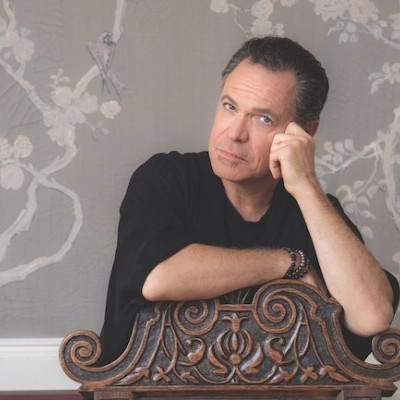
“Think of all the creative people I’m going to meet and a whole other way of thinking about music and a challenge of singing completely different material than I would have sung otherwise to my highest level in dedication to the moment,” Elling says about his Broadway run.
Sep 9, 2025 1:18 PM
Kurt Elling was back at home in Chicago, grabbing some family time in a late-June window between gigs. Sporting a smile…
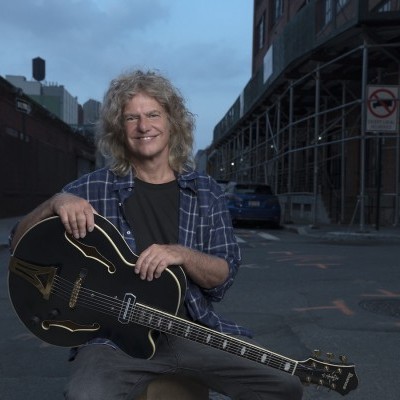
Pat Metheny will perform with his Side-Eye III ensemble at Big Ears 2026 in Knoxville, Tennessee, next March.
Sep 9, 2025 12:19 PM
Big Ears has announced the lineup for its 2026 festival, which will take place March 26–29 and include 250…
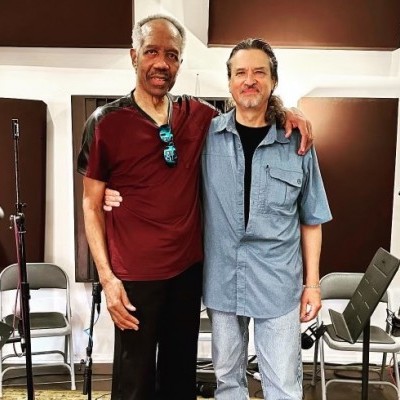
Mark Masters, right, with Billy Harper.
Sep 3, 2025 12:00 PM
The Rising Star Category of this publication’s annual Critics Poll was once called Talent Deserving Wider Recognition…